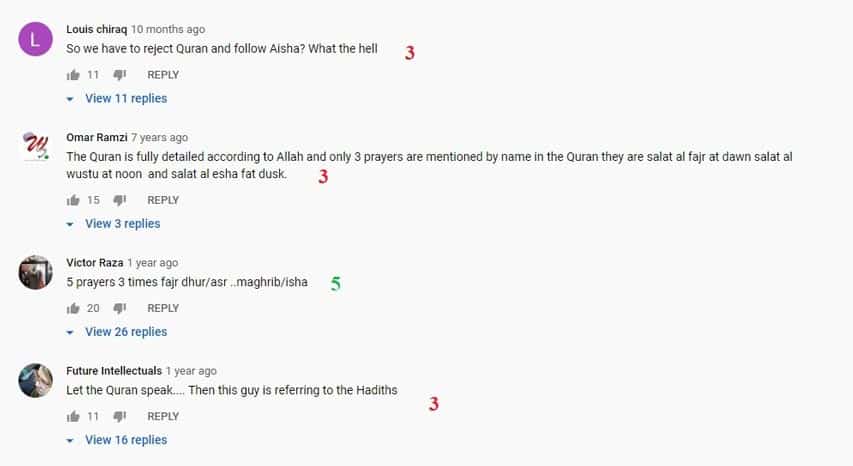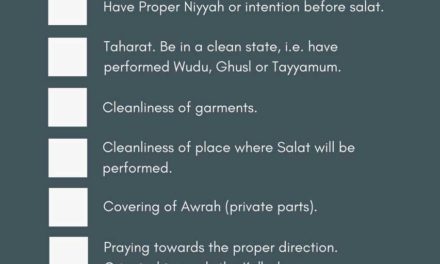
Surprisingly, this can be a controversial topic depending on what you were taught growing up.
The debate between 3 prayers or 5 is brought up and leads to lengthy debates.
Here’s what the YouTube comments section on one of the videos look like.
We will explore both sides of the arguments and provide a concluding answer to which side we believe has more validity regarding praying salah five times a day.
Verses From the Quran Regarding the daily Prayers:
In total there are around 67 verses in the Quran about Salat. Here’s a list of the common Quranic verses that are often referenced in debates as these one’s are specifically the commandments of Allah which prescribe the daily prayers as being mandatory.
17. فَسُبْحَـٰنَ ٱللَّهِ حِينَ تُمْسُونَ وَحِينَ تُصْبِحُونَ
Fa Subhaanal laahi heena tumsoona wa heena tusbihoon
So exalted is Allah when you reach the evening and when you reach the morning.
18. وَلَهُ ٱلْحَمْدُ فِى ٱلسَّمَـٰوَٰتِ وَٱلْأَرْضِ وَعَشِيًّۭا وَحِينَ تُظْهِرُونَ
Wa lahul hamdu fis samaawaati wal ardi wa ‘ashiyyanw wa heena tuzhiroon
And to Him is [due all] praise throughout the heavens and the earth. And [exalted is He] at night and when you are at noon.
114. وَأَقِمِ ٱلصَّلَوٰةَ طَرَفَىِ ٱلنَّهَارِ وَزُلَفًا مِّنَ ٱلَّيْلِ ۚ إِنَّ ٱلْحَسَنَـٰتِ يُذْهِبْنَ ٱلسَّيِّـَٔاتِ ۚ ذَٰلِكَ ذِكْرَىٰ لِلذَّٰكِرِينَ
Wa aqimis Salaata tarafayin nahaari wa zulafam minal layl; innal hasanaati yuzhibnas saiyi aat; zaalika zikraa liz zaakireen
And establish prayer at the two ends of the day and at the approach of the night. Indeed, good deeds do away with misdeeds. That is a reminder for those who remember.
238. حَٰفِظُوا۟ عَلَى ٱلصَّلَوَٰتِ وَٱلصَّلَوٰةِ ٱلْوُسْطَىٰ وَقُومُوا۟ لِلَّهِ قَٰنِتِينَ
Haafizoo ‘alas salawaati was Salaatil Wustaa wa qoomoo lillaahi qaaniteen
Maintain with care the [obligatory] prayers and [in particular] the middle prayer and stand before Allah, devoutly obedient.
58. يَـٰٓأَيُّهَا ٱلَّذِينَ ءَامَنُوا۟ لِيَسْتَـْٔذِنكُمُ ٱلَّذِينَ مَلَكَتْ أَيْمَـٰنُكُمْ وَٱلَّذِينَ لَمْ يَبْلُغُوا۟ ٱلْحُلُمَ مِنكُمْ ثَلَـٰثَ مَرَّٰتٍۢ ۚ مِّن قَبْلِ صَلَوٰةِ ٱلْفَجْرِ وَحِينَ تَضَعُونَ ثِيَابَكُم مِّنَ ٱلظَّهِيرَةِ وَمِنۢ بَعْدِ صَلَوٰةِ ٱلْعِشَآءِ ۚ ثَلَـٰثُ عَوْرَٰتٍۢ لَّكُمْ ۚ لَيْسَ عَلَيْكُمْ وَلَا عَلَيْهِمْ جُنَاحٌۢ بَعْدَهُنَّ ۚ طَوَّٰفُونَ عَلَيْكُم بَعْضُكُمْ عَلَىٰ بَعْضٍۢ ۚ كَذَٰلِكَ يُبَيِّنُ ٱللَّهُ لَكُمُ ٱلْءَايَـٰتِ ۗ وَٱللَّهُ عَلِيمٌ حَكِيمٌۭ
Yaaa aiyuhal lazeena aamanoo li yastaazinkumul lazeena malakat aimaanukum wallazeena lam yablughul huluma minkum salaasa marraat; min qabli Salaatil Fajri wa heena tada’oona siyaa bakum minaz zaheerati wa mim ba’di Salaatil Ishaaa’; salaasu ‘awraatil lakum; laisa ‘alaikum wa laa ‘alaihim junaahum ba’dahunn; tawwaafoona ‘alaikum ba’dukum ‘alaa ba’d; kazaalika yubaiyinul laahu lakumul aayaat wallaahu ‘Aleemun Hakeem
O you who have believed, let those whom your right hands possess and those who have not [yet] reached puberty among you ask permission of you [before entering] at three times: before the dawn prayer and when you put aside your clothing [for rest] at noon and after the night prayer. [These are] three times of privacy for you. There is no blame upon you nor upon them beyond these [periods], for they continually circulate among you – some of you, among others. Thus does Allah make clear to you the verses; and Allah is Knowing and Wise.
130. فَٱصْبِرْ عَلَىٰ مَا يَقُولُونَ وَسَبِّحْ بِحَمْدِ رَبِّكَ قَبْلَ طُلُوعِ ٱلشَّمْسِ وَقَبْلَ غُرُوبِهَا ۖ وَمِنْ ءَانَآئِ ٱلَّيْلِ فَسَبِّحْ وَأَطْرَافَ ٱلنَّهَارِ لَعَلَّكَ تَرْضَىٰ
Fasbir ‘alaa maa yaqooloona wa sabbih bihamdi Rabbika qabla tuloo’ish shamsi wa qabla ghuroobihaa wa min aanaaa’il laili fasabbih wa atraafan nahaari la ‘allaka tardaa
So be patient over what they say and exalt [ Allah ] with praise of your Lord before the rising of the sun and before its setting; and during periods of the night [exalt Him] and at the ends of the day, that you may be satisfied.
Is it 3 or 5 Prayers According to Quran?
In the Quran, there’s is no direct naming of the five prayers. It does not say pray Fajr, Zuhr, Asr, Maghrib and Isha salah.
Nowhere in the Quran does it say this explicitly.
The disagreement between the two sides of 3 prayers or 5 are due to different interpretation of the ayats presented above.
From Surah Nur it says “before the dawn prayer and when you put aside your clothing [for rest] at noon and after the night prayer.” Some Shiites would read this and interpret 3 daily prayers. But the Sunni’s would argue no, that’s not what the ayah is referring to as it is just referring to three distinct time periods.
Dawn – Fajr
Noon – Zuhr and Asr
Night – Maghrib and Isha
In Surah Baqarah it says guard your middle prayer. This really has no impact to determining how many daily prayers we should offer. In both cases Asr is the median or the middle prayer. We should be in agreement of the importance of Asr.
The ayah in Surah Rum and Surah Hud again only give reference to morning, evening and night. This is used by both sides to mean only offering three prayers one at each interval or the Sunni take the meaning offering two salat in the evening and two salat at night.
Hadith Which Mention the daily prayers:
We now shift our focus towards the hadith.
There are hadiths which commonly cite how the Prophet used to pray three salats. But these are often mentioned under conditions where he would be travelling and shortened the prayers. The Prophet would pray Fajr as usual, would pray once in the evening, and once more at night.
This can be perceived as three prayers, but what he was actually doing according in hadith of Sahih Muslim is that he intended to combine two prayers on a journey, he delayed the noon prayer till came the early time of the afternoon prayer, and then combined the two.
In the Sahih hadith of Ibn Majah. It was narrated from Mu’adh bin Jabal that the Prophet (ﷺ) combined the Zuhr and ‘Asr, and the Maghrib and ‘Isha’ when traveling during the campaign of Tabuk.
From the hadith there are many references to the five separate salah.
It was narrated from ‘Abdullah bin ‘Amr that the Prophet (ﷺ) said: “When you pray Fajr, its time is until the first part of the sun appears. When you pray Zuhr, its time is until ‘Asr comes. When you pray ‘Asr, its time is until the sun turns yellow. When you pray Maghrib, its time is until the twilight has disappeared. When you pray ‘Isha, its time is until half of the night has passed.”
Conclusion:
When just looking at the Qu’ran with no hadith the issue is a difficult one to draw a single conclusion. However, when coupled with the hadith of Prophet Muhammad the interpretation of the Qur’an becomes clearer.
This is why the Allah tells us in the Qur’an “Believe in Allah and His Messenger and the light which He sent down.” (64:8) He says, “We sent you as a witness and a bringer of good news and a warner so that they might believe in Allah and His Messenger.” (48:8-9) He says, “Believe in Allah and His Messenger, the unlettered Prophet.” (7:158)
Belief in the teachings of the Prophet Muhammad is therefore a necessary obligation for every individual.
In the Tafheem ul Quran (with regards to Surah Nuh ayat 17-18) it says,
Thus, the Quran at different places has pointed to the five Prayer times at which the Muslims all over the world offer their Prayers. But, obviously, no one by merely reading these verses could have determined the Prayer times unless the divinely appointed teacher of the Quran, the Prophet (peace be upon him) himself had given guidance to these by his word and deed.
Let us pause a while here and consider the boldness of the deniers of Hadith. They make fun of “offering the Prayer”, and say that the Prayer that the Muslims offer today is not at all the thing prescribed by the Quran. They assert that the Quranic injunction to establish the Salat does not mean the offering of the Prayer but establishing the Nizami Rububiyat (Order of Providence). Ask them: “What is that order of providence which can either be established before the rising of the sun or after the declining of the sun till the early hours of the night”? And what is that order of providence which is required to be established especially on Fridays? “O believers when you hear the call to the Friday Prayer, hasten to the remembrance of Allah” (Surah Al- Juma Ayat 9). And what is that special kind of the order of providence for establishing which one has first to wash his face and the hands up to the elbows and the feet up to the ankles and rub his head with wet hands, otherwise he will not establish it? (“O believers, when you stand up to offer the Salat, you must wash your faces and your hands and arms up to the elbows, and rub your heads with wet hands (Surah Al-Maidah Ayat 6).
We turn to the hadith often as it gives us the complete details to follow for Jummah and Wudu which would not be entirely clear just from the verses of the Quran. We should similarly follow the Sunnah of the Prophet regarding the prayers.
It is true, there is Sahih hadith in Muslim he offered three prayers in Medina when he was not travelling and not in fear.
Ibn ‘Abbas reported: The Messenger of Allah (may peace be upon him) observed the noon and afternoon prayers together in Medina without being in a state of fear or in a state of journey. (Abu Zubair said: I asked Sa’id [one of the narrators] why he did that. He said: I asked Ibn ‘Abbas as you have asked me, and he replied that he [the Holy Prophet] wanted that no one among his Ummah should be put to [unnecessary] hardship.)
But there are more accounts of prayers be prayed separately. If we also remember that those who pray salat are spending time in remembrance of Allah and not wrong-doing. Praying the salat together leaves more idle time and one thing the Bible has correct is, “idle time is the devils playground”. For this reason it is better for you to pray salat separate.
Let me know your thoughts below, are you in agreement of the 5 prayers or 3?





Quran doesnt contain all details? Perhaps because all these details are not necessary!
I agree with 5 times prayer going through Surah Bakarah Ayat 238 ,Sura HUD Ayat 114 and Sura Rum Ayat 17
I think I get it. You have to do 5prayers. You can combine 2 prayers like Zuhur & Asar. And Maghrib and Isyak. Your prayer combination can be 1,2,2 or 1,1,2,1 or 1,1,1,2. if you don’t have much time to separate these prayers. Like example,working environment and break time. Islam does not make a burden on its subjects.But if you have all the free time, it’s best to follow at appointed time.
By the way, when you combine 2 prayer, it means you’d do 1 set prayer stop, and continue with next set prayer correct?
I agree with 5 times prayer going through Surah Bakarah Ayat 238 ,Sura HUD Ayat 114 and Sura Rum Ayat 17
and hadith Rasul S:
The explanation of this article is very helpful, because at this time there are a lot of shia who destroy the problem of praying 5 times not in the Qur’an, Jazakallah khair.
In favour of three times a day as in Quran it’s 3 times and Quran is important than anything else on the day of Judgement you won’t be asked whether you had read Al Bukhari
I am going to with 3 time as clearly mentioned in holy Quran.. while human interpretation are not correct in 100% b/c their affiliation in by birth practic may be affected interpretation. So legal source is s Quran and oral can’t relay on oral (reference) sources
3 times a day…The Quran is the message from the prophet. follow the prophet is believe in the Quran Allah’s mercy.
I love Islam
What I have read is that, the Salat in details is not established either by Qur’an Kerim nor hadiths but by Consensus of the Muslims or the Ummah.
If we take Qur’an Kerim as a whole thing or within the context without basing certain things (3 daily prayers) on few Ayahs, we get 5 Daily Prayers.
Thank You for reading and Selam Aleikum Sisters and Brothers
When the Quran says to gaurs your middle prayer, I believe it refers to the fajr as being the middle. Islam goes by the lunar calendar, so technically the first r prayer is mughrib, the middle
Prayer would be fajr. This also aligns with the fact that We know fajr to be one of the most important prayers of the day.
There is something in the Quran which says noon prayer. Does it mean to zuhr and asr ?
As brother Anas said above, the Qur’an and not the words of men who said the prophet said so and so, or the prophet practiced so and so. On judgement day we’ll be asked on our own accord.
The Qur’an will be the proof, or the Hadith? Or both?
I am a new to Islam and from my perspective this argument is really beyond the point because
The Quran is stating directly 3 times of prayers but
a few ayats 5 hadidh stated that Our Prophet SAW as well pray 5 times and other 3 times
In conclusion that simply BOTH are right
As long you fulfill your 5 prayers on appointed times or 3 times a day your 5 prayers at appointed times
The Holy Quran always should be the first no matter what and Our Prophet SAW will never do something in contradiction to Quran.
Does anyone know of any specific Hadith or riwayat that clearly says Nabi Muhammad (s.a.w.) prayed 5 times separately every day? Except when he was traveling.
I don’t know where and why the confusion started. Quran is quite clear about three prayers and according to hadis prophet prayed three times while in madina and when asked about it he said he doesn’t want his followers to have more burden. Then why should we look for other hadis till we find the one emphasizing five prayers which actually became difficult to perform in current times and people s job situations which are different than 14th century jobs and commitments.
According to Sunni Book of Hadith “Sahih Muslim” Hadith 6225 : We have to follow Quran and Ahl e Bait(AS). So Quran is referring 3 times of Salah, I go with 3 times of prayers. And if the mentioned sahih Hadiths according to you is narrated by any member of Ahl e Bait(AS) then I had to accept it but neither Abdullah bin ‘Amr is member of Ahl e Bait(AS) nor any wives ( according to Sunni book Sahih Muslim Hadith#6225,6226,6227,6228) of Nabi e Karim(SAWW). So I will go with what Quran is saying.
If someone follows only the QURAN throughout his/her entire life.. will you consider that as a sin without following any Hadith ?
Suah Ar-Rum: morning, noon, night.
Surah Hud: fajr isha, and approach of night, maghrib.
4 so far
Surah Baqarah: middle prayer.
If the quran mentions dawn, noon, approach of night, and night and a “middle prayer” I conclude there’s 5 daily mandatory.
I was born a Muslim. I had an unhappy childhood by religious parents who preached importance of reading namaz. I hated going to mosque. The maulanas flirted with all the older girls. My parents always complain and are pessimistic about everything. Though being devout Muslims, My parents are rarely happy. They married over 50 years. What’s the purpose of this religion? To turn people into unhappy buffoons. The maulanas preach nonsense at the mosque. My father told us not to laugh or talk in the house. Satan is watching. They say at the mosque that Prophet Muhammad was tying stone on stomach and starving. In Prophet Muhammad lifetime, he fought over 1000 battles and kept 20 percent of the loot. Why not preach about that instead of emphasizing the suffering? Why is this religion so negative? Why don’t the maulanas spread more uplifting messages? Namaz shouldn’t be forced on children. My parents made all our siblings hate one another by inciting competition and gossiping about each child to the other. Can the maulanas tell people to stop reading the news and stop harassing their kids on crime rates and misery in the world? I don’t care about ukraine or UK or South Africa. My dad is wealthy, for years, he made my mum drive a junk car whilst he drives BMW. He gives her allowance and then makes her pay for home renovations. Surely my dad is going to hell. When our siblings are succeeding in life, he tries to knock them down. Why are Muslim men so miserable? Too much emphasis on reading namaz, reading Quran, serving God, being unhappy? How are Christians living great lives, having great family life, and succeeding in their lives without hatred from family members? The problem with Islam is in the teachings. Fast for one day and all your sins are forgiven. So its okay to be cruel to your loved ones on other days? Just fast, God will forgive. What nonsense. Preach that namaz and fasting is not a get out of jail card to abuse family mentally and emotionally! We won’t forgive, that is still bad karma. Religion, no matter what you practice should not be used as an excuse to cause further abuse! His behavior is pushing all of us away from Islam. Why he listens to indian/urdu music. It’s haraam to see young woman gyrating with their bellies and undulating like snake dancers! These old men need to realize that they are not young and fast. They are not heroes or stallions. They are old farts. Also teach at the mosque, that sons mustn’t try to turn their mothers into maids and cooks for their future wives. These young sons will go to hell if they mistreat their young mothers.
to my sister mariam and about her abusive father
r u shia?
know that its a test
like all hardships in life.
when the test comes to yur desk in class
and if u r not prepared what r u to do
if u didnt study from the right text what r u gona do
well Quran is the ultimate guide for all mankind of all ages
this book is classic and has all the answers
u can complain to Allah or blog all day long
sorry he made u against certain muslims,
however Islam is pure, religion cannot b forced
but 1 will make the turnaround and look for answers
in Quran and may turn to prayers for the tranquility
this dunya is a test, a temporary abode
we all should b more worried about eternal life, the spiritual life.
listen to humza yusuf , mufti menk, and nouman ali khan
I believe the Salat can be either 3 or 5 prayers however it depends on which community consensus that you have been admitted to. If Allah wanted to give us specific instructions as to how many prayers were required he would have done so but instead the requirements are said to be “unclear” So Muslims have followed Hadith and Sunna for a better explanation. Allah allows an individual and community to grow in their Deen. Allah does not restrict Salat to any specific number in the a Quran nor does he increase that number to anything excessive. The correct path would be to follow the Middle course..
thanks for the teaching but most people are blind about our deen so teach the world our deen.
Who cares whether it’s 3 or 5. Some muslims so-called or any religions DO NOT pray at ALL. We have bigger sins to worry about than just lip service. Prayer is important, but deeds have to support it and action!
Both are correct